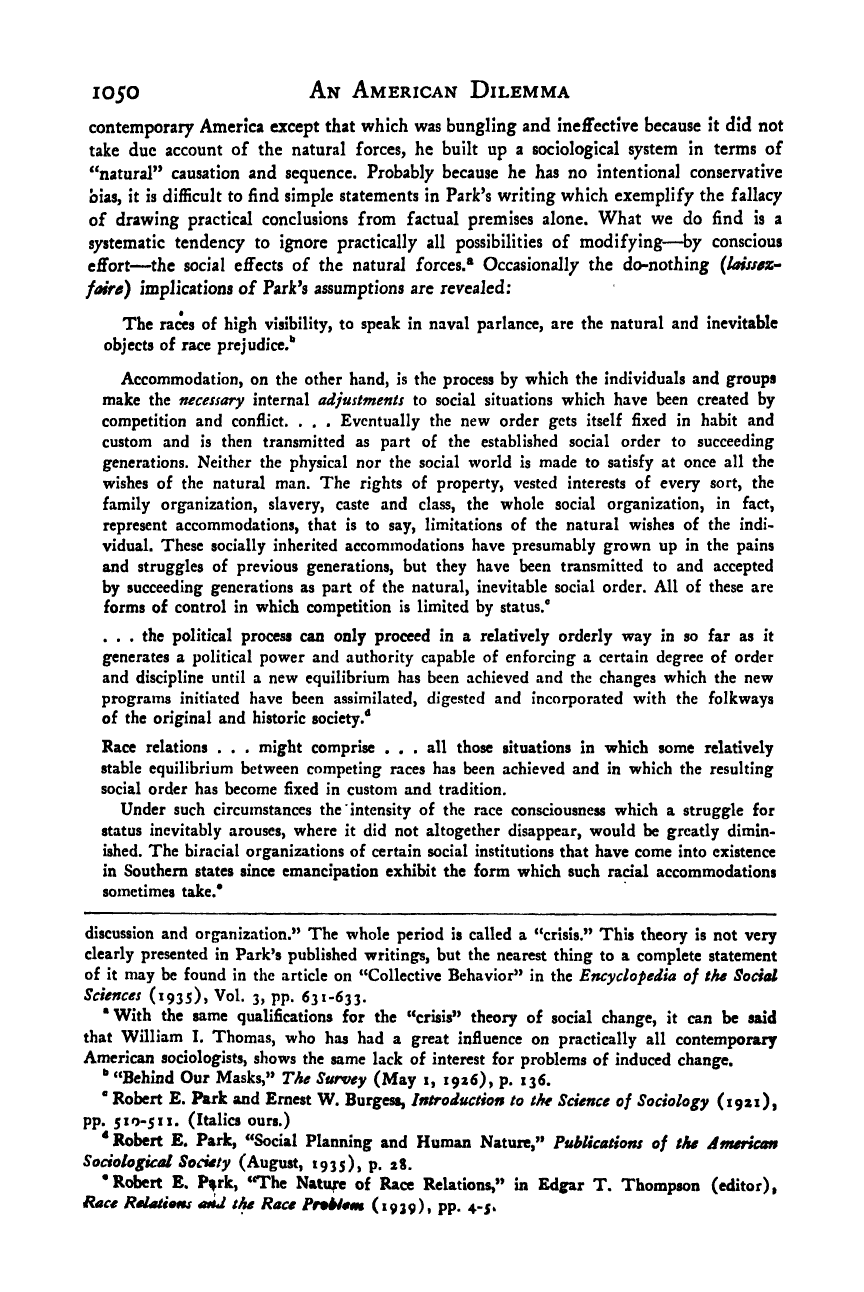Note: Gunnar Myrdal died in 1987, less than 70 years ago. Therefore, this work is protected by copyright, restricting your legal rights to reproduce it. However, you are welcome to view it on screen, as you do now. Read more about copyright.
Full resolution (TIFF) - On this page / på denna sida - Appendices - 2. A Methodological Note on Facts and Valuations in Social Science - 3. The History and Logic of the Hidden Valuations in Social Science

<< prev. page << föreg. sida << >> nästa sida >> next page >>
Below is the raw OCR text
from the above scanned image.
Do you see an error? Proofread the page now!
Här nedan syns maskintolkade texten från faksimilbilden ovan.
Ser du något fel? Korrekturläs sidan nu!
This page has never been proofread. / Denna sida har aldrig korrekturlästs.
1050 An American Dilemma
contemporary America except that which was bungling and ineffective because it did not
take due account of the natural forces, he built up a sociological system in terms of
“natural” causation and sequence. Probably because he has no intentional conservative
bias, it is difficult to find simple statements in Park’s writing which exemplify the fallacy
of drawing practical conclusions from factual premises alone. What we do find is a
systematic tendency to ignore practically all possibilities of modifying—^by conscious
effort—the social effects of the natural forces.® Occasionally the do-nothing {laissfiz^
faire) Implications of Parkis assumptions are revealed:
The races of high visibility, to speak in naval parlance, are the natural and inevitable
objects of race prejudice.**
Accommodation, on the other hand, is the process by which the individuals and groups
make the necessary internal adjustments to social situations which have been created by
competition and conflict. . . . Eventually the new order gets itself fixed in habit and
custom and is then transmitted as part of the established social order to succeeding
generations. Neither the physical nor the social world is made to satisfy at once all the
wishes of the natural man. The rights of property, vested interests of every sort, the
family organization, slavery, caste and class, the whole social organization, in fact,
represent accommodations, that is to say, limitations of the natural wishes of the indi-
vidual. These socially inherited accommodations have presumably grown up in the pains
and struggles of previous generations, but they have been transmitted to and accepted
by succeeding generations as part of the natural, inevitable social order. All of these are
forms of control in which competition is limited by status.®
... the political process can only proceed in a relatively orderly way in so far as it
generates a political power and authority capable of enforcing a certain degree of order
and discipline until a new equilibrium has been achieved and the changes which the new
programs initiated have been assimilated, digested and incorporated with the folkways
of the original and historic society.^
Race relations . . . might comprise ... all those situations in which some relatively
stable equilibrium between competing races has been achieved and in which the resulting
social order has become fixed in custom and tradition.
Under such circumstances the ’ intensity of the race consciousness which a struggle for
status inevitably arouses, where it did not altogether disappear, would be greatly dimin-
ished. The biracial organizations of certain social institutions that have come into existence
in Southern states since emancipation exhibit the form which such racial accommodations
sometimes take.®
discussion and organization.” The whole period is called a “crisis.” This theory is not very
clearly presented in Park’s published writings, but the nearest thing to a complete statement
of it may be found in the article on “Collective Behavior” in the Encyclopedia of the Social
Sciences (1935), Vol. 3, pp. 631-633.
“With the same qualifications for the “crisis” theory of social change, it can be said
that William I. Thomas, who has had a great influence on practically all contemporary
American sociologists, shows the same lack of interest for problems of induced change.
**
“Behind Our Masks,” The Survey (May i, 1926), p. 136.
* Robert E. Park and Ernest W. Burgess, Introduction to the Science of Sociology (1921),
pp. 510-51 X. (Italics ours.)
^Robert E. Park, “Social Planning and Human Nature,” Publications of the American
Sociological Society (August, 1935), p. 28.
•Robert E. P^rk, “The Nature of Race Relations,” in Edgar T. Thompson (editor),
Race ReUuiam and Race Prabiem (1939), pp. 4-5»
<< prev. page << föreg. sida << >> nästa sida >> next page >>